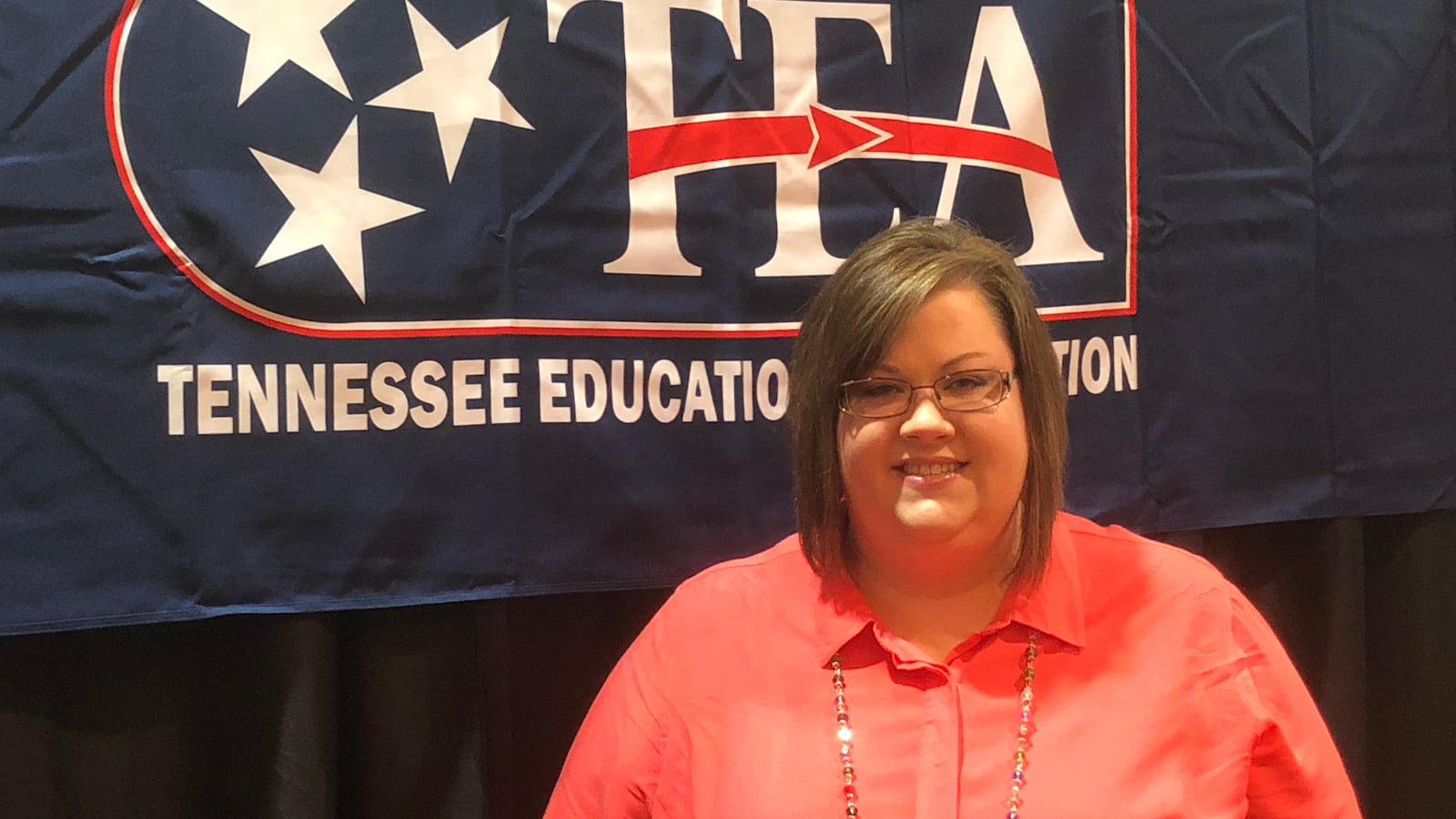When Beth Brown takes office July 1 as the new president of the Tennessee Education Association, she’ll become the youngest elected leader of the state’s largest teacher organization in three decades.
Now in its 153rd year, TEA has been represented in recent decades by a string of presidents who retired after leaving office and did not return to the classroom. At age 38, Brown will be the exception.
“It’s a unique opportunity,” she said. “I’ll get to work with teachers across the state to understand their vision for public education and learn what they need to help their students succeed.”
A high school English teacher in rural Grundy County, Brown will take a two-year leave from her job and move temporarily to Tennessee’s capital, where she’ll represent educators statewide.
Among her priorities will be advocating for increases in school funding and teacher pay. She wants to see an end to the state’s policy of including standardized test scores in teacher evaluations. She also wants to attract new teachers to the profession and spotlight rural education.
TEA is not a union. The association’s membership declined after the Legislature voted to end collective bargaining in 2011, but leaders say their numbers have rebounded in recent years, though they declined to give specifics. Membership dues are the group’s primary source of income.
Serving as vice president of TEA for four years, Brown has had an active voice on teacher issues at local, state and national levels, including roles in membership, negotiations, and grievances. She’ll replace retiring president Barbara Gray, a former assistant principal in Shelby County’s Arlington Middle School.
In a recent interview with Chalkbeat, Brown talked about her new role, how she hopes to elevate respect for the teaching profession, why she believes the state’s emphasis on TNReady is a mistake, and what made her a passionate advocate for rural education. This interview has been edited for clarity and brevity.
One of your goals is to recruit and support new teachers. Describe the state of the teaching profession in Tennessee?
If you look at the data regarding the age brackets of educators, we have a significant percentage of educators eligible for retirement in Tennessee. And while we have an influx of early career educators, they’re not staying in the profession. I love being a teacher. As president of the TEA, I want to bring back some of the respect for the profession, some of the joy in the profession. I want to make it so early career educators aren’t just surviving, but that they’re thriving. We cannot afford for all of our early career educators to leave within the first five years. Experience is really important in our classrooms. Students have better educational outcomes when they have teachers who grow because teaching is a craft and you get better every year. We’ve got to create a space where our early career educators are really supported.
Why aren’t new teachers staying in the profession?
I think there’s this false narrative that public education is failing and that teachers are failing. I think that narrative is furthered by this cycle of standardized testing where we base high-stakes decisions on a single standardized test. Because of the pressure that goes along with that, we don’t necessarily get raises; we get bonuses based on a differentiated pay plan, which is based on our evaluations which come largely from student test scores. We have this system of testing and these really rather punitive decisions based on testing that do not encourage people to enter the profession. It is extremely stressful. It’s very narrowly focused because so many decisions are tied to a single test.
State standardized testing didn’t go smoothly this year, but TNReady is Tennessee’s primary tool for assessing and tracking student progress, and improving instruction. Given that our students have shown gains on several national assessments in recent years, how do we strike the right balance?
We have to get back to focusing on what’s best for our students. We need more time for one-on-one attention and instruction. Students need to be learning critical thinking and problem-solving skills. They need to be able to be creative through a well-rounded education that’s going to set them up for success. Of all the things we teach our students, the most important is the level of learning and no standardized test can measure that. Teachers are not opposed to testing or evaluation. We invented tests. But what we want is a fair system that accurately measures student achievement and teacher performance.
Can faith in TNReady be restored, and how?
We’ve had too many years of state testing failures. There is zero trust from parents and students and educators in our current state assessment system. I think this is a great time to look at what else we can do that’s going to work and will be more fair. This spring during TNReady testing, we saw students, parents, educators, and legislators working together to say “enough is enough.” I want to capitalize on that momentum and do something that’s better for Tennessee students and educators. That will be one of my priorities over the next year.
When you say something better, are you saying the state should scrap TNReady and start all over?
I’m saying we do not need accountability based on a single standardized test, particularly one like TNReady that has failed repeatedly. There are so many other ways to offer a better snapshot of student performance and teacher effectiveness with things like appropriate pre- and post-testing, creative use of benchmark testing, other gauges of student progress, portfolios that are done correctly. There are lots of things we can do. I don’t have the answer, but I don’t think a standardized testing company has the answer either. We need a group of educators to come together, take our collective knowledge, and design a system to evaluate student and teacher and school performance. Those decisions right now are made by people who are not teachers, and I think that’s a real shame.
You’ve taught for 17 years in rural Tennessee. What are the challenges of public education in that setting, and why has rural education become a passion for you?
It goes back to a personal story from college. It was never my plan to teach at the high school from which I graduated. When I was a high school senior, my plan was to leave Grundy County and never come back because options are so limited and I wanted to be able to go to the theater and do things you can’t do in a rural place. But in my first year in college, I had a journalism class where I was doing well and my professor complimented me and asked me where I went to school. When I told him Grundy County High School, he said, “You’re the first decent student I’ve had to come out of that school.” I was heartbroken. At that point, I made a decision that, if I ever wound up back in Grundy County, I would do everything I could to make sure that no student ever had to hear that again.

Over the years, I’ve realized how few opportunities there are for students in a place like Grundy County to experience the world. For my students, their world is very, very narrow. There is very little diversity — not just racially but also ethnically and socioeconomically. It’s a very homogenous community. Many have never left the county. Those who have left may have gone to someplace like Chattanooga, which is 45 minutes away..
Rural districts like mine don’t have the resources to provide technology, or updated textbooks or things that students really need to be academically successful. We don’t have resources for related arts programs. We don’t have the opportunity to provide our students what suburban or urban districts can have. I think it’s a real shame. Public education should not rely on students winning the zip code lottery. It does not matter whether a student is in Memphis, Mountain City, or Monteagle Mountain. Every student deserves a quality public education and deserves to have teachers who are well-trained, well-prepared, well-supplied to help their students be successful.
How can you enhance rural education at the policy level?
A lot of it goes to funding. Led by Gov. Bill Haslam, the state has increased education funding by $1.5 billion during his administration and increased state teacher salary funds by some $356 million in the last four years. But there’s still a lot of work to be done. While the General Assembly has done its part to increase teacher pay, most Tennessee teachers have not seen those increases in their paychecks. I certainly have not. Pay is an important part in attracting and retaining the most qualified and committed educators. It’s hard to recruit someone to a profession that doesn’t pay well. There are people who would consider becoming an educator but, by the time they graduate from college, they may have $50,000 in student debt and can’t pay that off with a teacher’s salary. So we’ve got to make sure that we continue to fund and improve our funding in public education.
I want to see Tennessee’s investment per student increase to the Southeastern average by 2020. That’s my goal. While it crushes me to lose to Alabama in football, it’s even more heartbreaking to lose to Alabama in education funding.
This is a major election year for Tennessee as we choose a new governor and fill dozens of open legislative seats with people who will set the course for education policy. What is TEA’s election game plan, and what messages will you emphasize?
TEA will be working with our members to get them educated on the issues and get them to the polls. We’ll be meeting with the candidates and educating them on what our students in our schools need. It’s a critical election year, and TEA will be doing everything we can to elect pro-public education candidates. We have a saying at TEA: It’s not about R, it’s not about D, it’s about E. We want pro-public education candidates to win, whether they’re Republican or Democrat.

